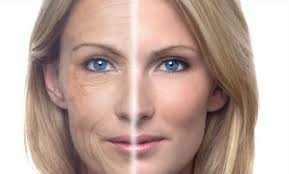Many environmental factors can contribute to wrinkles and skin ageing. These can all be controlled to a certain extent, to maintain a more youthful skin profile. The main influencing environmental factors include; oxidative stress (mainly by sun damage), inflammation, ischaemia (reduced blood flow), smoking, pollution, sleep deprivation and poor nutrition.
- Antioxidants and carotenoids are present in the foods we eat, and have been shown to reduce the effects of sun damage on the skin.
- Carotenoids are derivatives of vitamin A, examples are β-carotene, astaxanthin, lycopene and retinol.
- Antioxidants have been shown to reduce skin redness after sunburn by 40%. High antioxidant foods include; citrus, and berries.
- Alcohol consumption reduces the presence of antioxidants in the skin, thus counteracting their protective effects.
- Carotenoids are available in a wide range of foods; β-Carotene is contained in carrots, pumpkin, sweet potatoes, mangos and papaya; Astaxanthin is found in microalgae, yeast, salmon, trout, krill, shrimp, crayfish and crustacea; Good sources of lycopene are tomatoes (cooked is better) and other red fruits and vegetables, such as red carrots, watermelons and papayas; Retinol and its constituents must be consumed in the diet as they cannot be synthesised by the body. Retinol is present in foods such as; Fish oils and fatty fish, dairy, and liver.
- For vegans, nutritional constituents found in spinach, kale, squash and carrots can be readily converted into retinol by the body, but fats such as avocado or olive oils should be consumed at the same time to increase absorption.
- Prunes, apples and tea are particularly effective at reducing oxidative damage to the skin by sun exposure. Just a few months of increased green tea intake have been shown to reduce skin roughness by 16%. Eating a moderate amount of carotenoid rich foods can even cause a protective carotenoid build up in the skin, giving you a golden glow similar to tanning in the sun.
- Vitamin D3 can reduce the harmful effects of the sun on the skin. It decreases with age and we can lose up to 50% between the ages of 20 and 80, taking vitamin D3 supplements can be beneficial for skin health as we age.
- Polyphenols such as contained in green tea, turmeric, resveritrol in grape skins, sylimarin from milk thistle, coffee, legumes, cereals and chocolate. Can all help to modulate the action of cell signals involved with the ageing process. Reducing the action of these cellular pathways can help to decelerate the ageing process, particularly in the skin.
- Coenzyme Q10 or Ubiquinol is an important mediator of energy production in the body, it also decreases oxidative damage in the skin. Dietary sources of CoQ10 include oily fish (such as salmon, mackerel and tuna), organ meats (such as liver), and whole grains.
- Optimising the bacterial makeup in the gut can have positive effect on the bacterial make-up of the skin. Taking probiotics can help to positively adjust your bacterial makeup and reduce the chance of developing rashes and allergic reactions in the skin.
- Collagen is one of the main constituents of the skin and a destabilisation of the collagen structure can contribute to wrinkle formation, Vitamins C and E have been shown to increase collagen stability and protect from sun damage.
- Good sources of vitamin C are; citrus fruits, blackcurrant, rose hip, guava, chili and parsley. Vitamin E is present in most vegetables, seeds, corn and soy beans.

